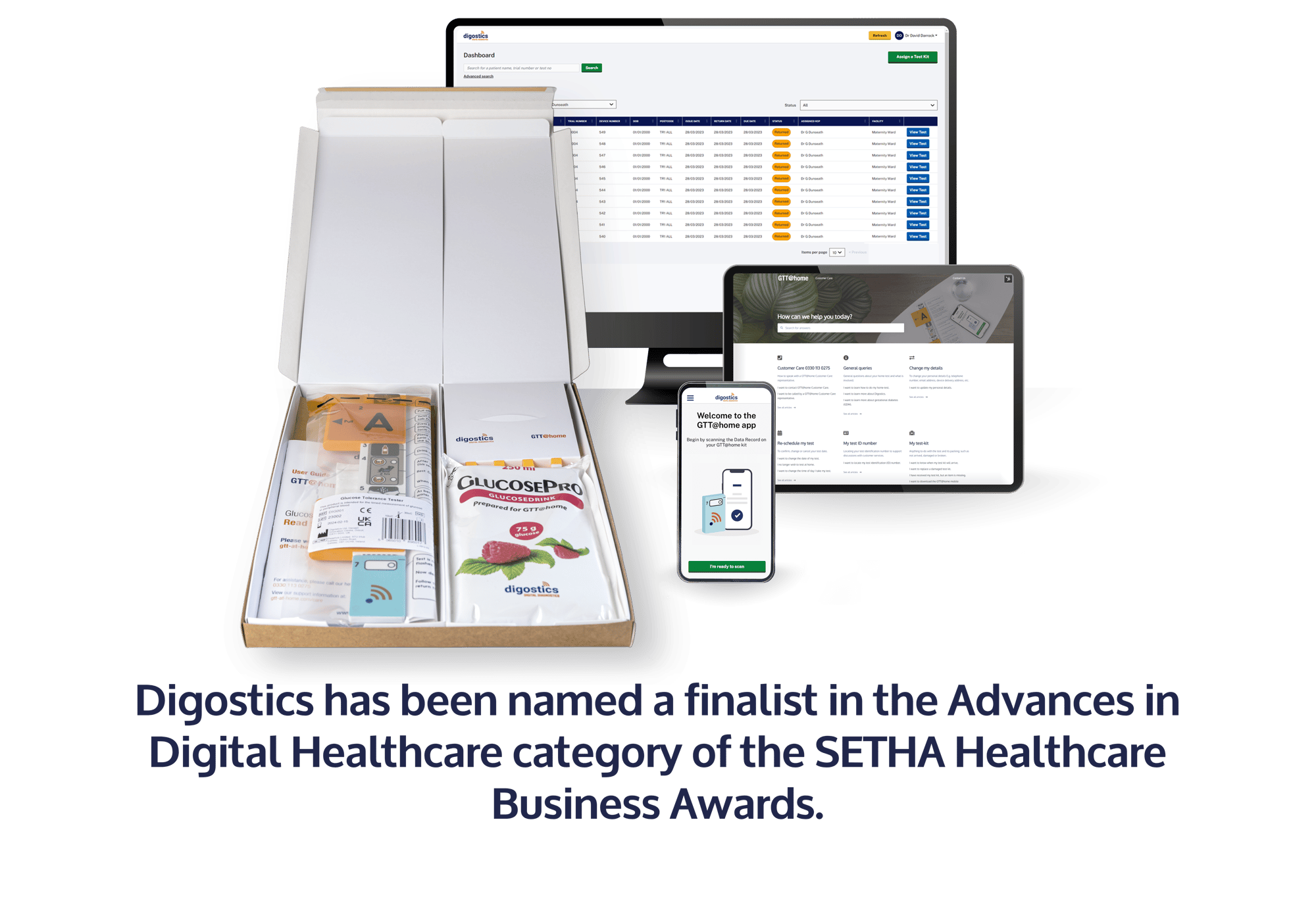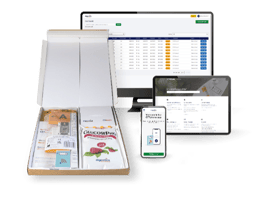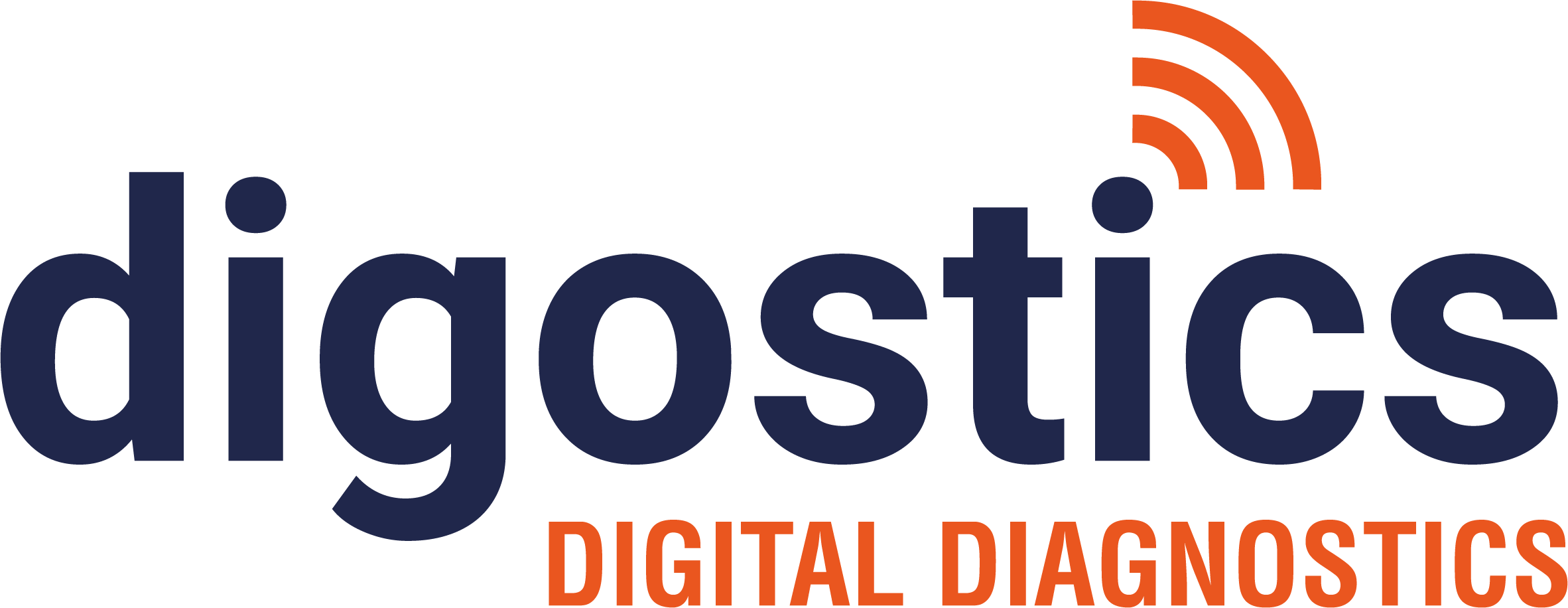Digostics Shortlisted for SEHTA ‘Innovation’ Award for Advancing At-Home Gestational Diabetes Testing in Maternity Care
Digostics Shortlisted for SEHTA ‘Innovation’ Award for Advancing At-Home Gestational Diabetes Testing in Maternity Care
NHS Hospital Trust Pilot of New Testing Technology Sees Pregnant Women in Southampton Become the First Patients Globally to Access Gestational Diabetes Testing at Home.
NHS Hospital Trust Pilot of New Testing Technology Sees Pregnant Women in Southampton Become the First Patients Globally to Access Gestational Diabetes Testing at Home.
Oxford, United Kingdom 27/03/2025 – British life sciences innovator Digostics has been shortlisted for the Science & Engineering Health Technologies Alliance (SEHTA) Advances in Digital Healthcare Award for its groundbreaking work in developing the world’s first at-home oral glucose tolerance test (OGTT) to diagnose gestational diabetes.
A key aspect of the innovative GTT@home test is that it analyses blood samples instantly and can immediately share the results with the antenatal care team. This means that patients do not have to travel to a hospital or clinic to take the test and avoids costly hospital or clinic-based testing. The GTT@home test is equivalent to lab-based OGTTs, and, by testing samples instantly, can actually provide more accurate results as the glucose in the sample does not have a chance to degrade. [1]

Independent research funded by the National Institute of Health and Care Research (NIHR) and published in Diabetic Medicine found that standard NHS OGTT testing practices mean that over 50% of gestational diabetes cases are being missed. [2]
Professor Claire Meek, Professor of Chemical Pathology and Diabetes in Pregnancy, who led the research, said:
“Gestational diabetes is very common in the UK and causes complications at birth, affecting both mother and child. Fortunately, most complications can be prevented with accurate diagnosis and timely access to treatment. However, if the diagnosis is not accurate, affected mothers are unable to receive the care they need.”
.png?width=1000&height=886&name=Stock%20Image%20-%20Model%20with%20Device%20-%20Test%202%20+%20Blue%20Tramline%20-%20Left%20and%20Right%20(11).png)
If left undetected and, therefore, untreated gestational diabetes significantly increases the risk of complications during birth including preeclampsia in mothers and neonatal intensive care admission for babies due to breathing difficulties, low blood sugar, and, in severe cases, stillbirth.
Women who have had gestational diabetes are also at a much higher risk of developing type 2 diabetes later in life. Studies show that up to 50% of women with gestational diabetes develop type 2 diabetes within five to 10 years after pregnancy [3]. Babies born to mothers with gestational diabetes also have an increased likelihood of developing type 2 diabetes later in life [4].
Beyond improving diagnostic accuracy, the GTT@home test is significantly more accessible and convenient—a game-changer for women who face challenges attending clinic-based tests. Since OGTTs must be taken first thing in the morning after fasting, hospital-based testing requires arranging childcare, taking time off work, and managing transportation. Studies have shown that women from socio-economically deprived backgrounds are less likely to attend or complete OGTTs. [5] [6]
GTT@home has already been implemented in NHS trusts within the South of England, significantly increasing the detection of gestational diabetes. It has also been found to be simple to use across all segments of the population, with multilingual support available through videos, print materials, and online resources.
James Jackson (CEO) of Digostics, said:
“For too long, maternity care has lagged behind other areas of medicine when it comes to adopting innovation. We have the technology to make gestational diabetes testing safer, more convenient, and more efficient—yet many NHS Trusts continue to rely on traditional methods that are no longer fit for purpose. It’s time to modernise maternity services and ensure that expectant mothers receive the best care possible. Unfortunately, this is true across the world and we are already testing the technology in the US, Middle and Far East.”
“We are very pleased to be partnering with the NIHR Oxford Biomedical Research Centre on this study," said James Jackson, CEO and Founder of Digostics. "We believe that there is huge potential for the widespread use of at-home OGTT testing to diagnose T1D. Not only is it more attractive for young children to be able to be tested at home, but the results from our GTT@home test are not affected by the time-dependent sample degradation that can lead to false negative OGTT results with in-clinic testing."
Dr Rachel Besser, who leads the T1Early programme at the University of Oxford and is overseeing this work, said “A more practical and reliable alternative to the in-clinic OGTT would be a welcome advance and could improve the experience and therefore the uptake of children who have an OGTT as part of their care.”

"We hope this revolutionary new at-home test is going to dramatically change the way we deliver gestational diabetes testing during antenatal care."
Dr Matthew Coleman




Click the button below for more GTT@home product-specific information exploring:
• the GTT@home test kit's contents
• the novel GTT@home test device
• at-home versus in-clinic test comparisons
• patient and healthcare professional support


Click the button below for more GTT@home product-specific information exploring:
• the GTT@home test kit's contents
• the novel GTT@home test device
• at-home versus in-clinic test comparisons
• patient and healthcare professional support
[1] The World Health Organization (WHO) and American Diabetes Association (ADA) recommend that, if OGTT blood samples aren’t tested immediately they should be cooled in an ice slurry and centrifuged within 30 minutes to minimize glucose degradation
[2] Diabetes Medicine. Barriers to completing oral glucose tolerance testing in women at risk of gestational diabetes. E H Lachmann, R A Fox, R A Dennison, J A Usher-Smith, C L Meek, C E Aiken https://pubmed.ncbi.nlm.nih.gov/32144795/
[3] Mother To Baby | Fact Sheets [Internet]. Brentwood (TN): Organization of Teratology Information Specialists (OTIS); 1994-. Gestational Diabetes. 2023 Apr. Available from: https://www.ncbi.nlm.nih.gov/books/NBK582729/?utm_source=chatgpt.com
[4] Pregnancy and Gestational Diabetes: Causes, Risks, Management
[5] Lachmann EH, Fox RA, Dennison RA, Usher-Smith JA, Meek CL, Aiken CE. Barriers to completing oral glucose tolerance testing in women at risk of gestational diabetes. Diabet Med. 2020 Sep;37(9):1482-1489. doi: 10.1111/dme.14292. Epub 2020 Mar 18. PMID: 32144795; PMCID: PMC8641378.
[6] Gnanasambanthan S, Jabak S, Mohan R, Dayoub N, Maduanusi C, Kohli S, Haas-Heger T, Lynch C, Hameed A. The impact of socioeconomic deprivation on the prevalence of gestational diabetes: An observational study. Obstet Med. 2024 Dec;17(4):201-207. doi: 10.1177/1753495X231213920. Epub 2023 Nov 14. PMID: 39640950; PMCID: PMC11615992.
About University Hospital NHS Foundation Trust
University Hospital Southampton NHS Foundation Trust provides services to some 1.9 million people living in Southampton and south Hampshire, plus specialist services such as neurosciences, cardiac services and children's intensive care to more than 3.7 million people in central southern England and the Channel Islands.
UHS is one of the largest acute teaching trusts in England with a staff of 13,000 and a turnover of more than £1bn in 2020/21.
We are one of only two major trauma centres in the South of England for both adults and children.
UHS is consistently one of the UK’s highest recruiting trusts of patients to clinical trials.
Could GTT@home be of assistance to your patients?
Please get in touch by completing the form below or calling us on +44 (0)330 113 9145.
References
¹ International Diabetes Federation - Diabetes Atlas 10th Edition 2021
² NHS Gestational Diabetes Overview
³ International Diabetes Federation - Care and Prevention - Gestational Diabetes
† Pubmed - Future risk of diabetes in mother and child after gestational diabetes mellitus 2009
Images of Matthew Coleman and of University Hospital Southampton's premises are kindly provided by University Hospital Southampton NHS Foundation Trust.
